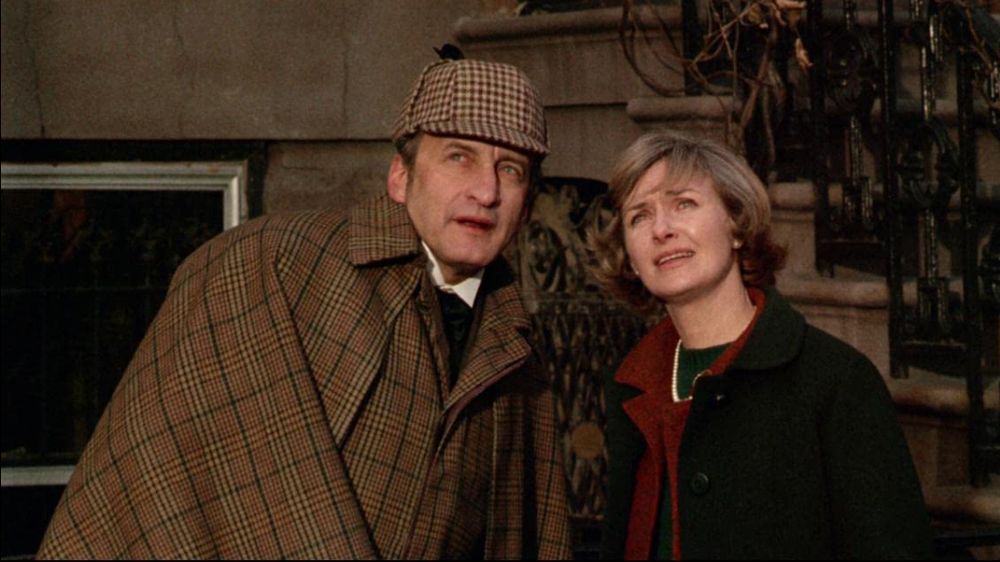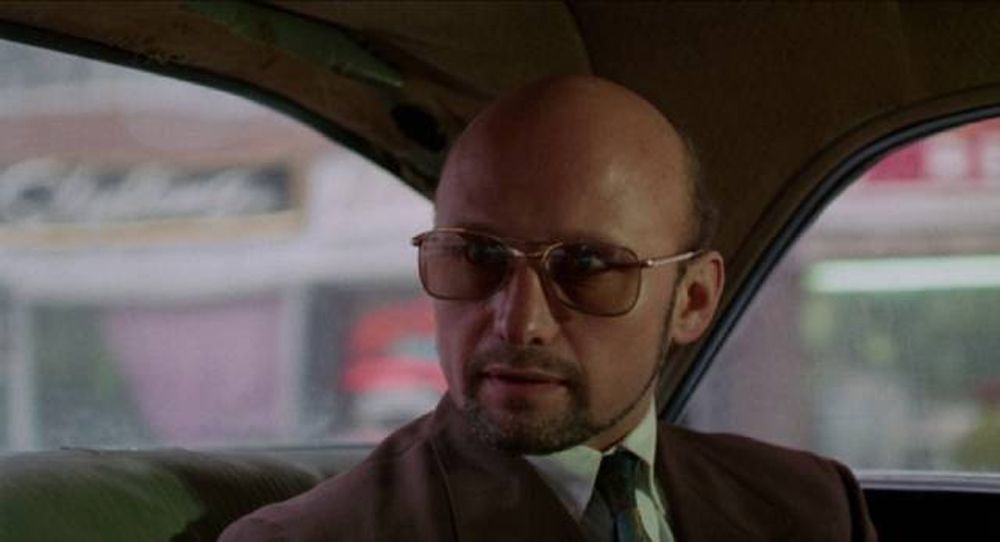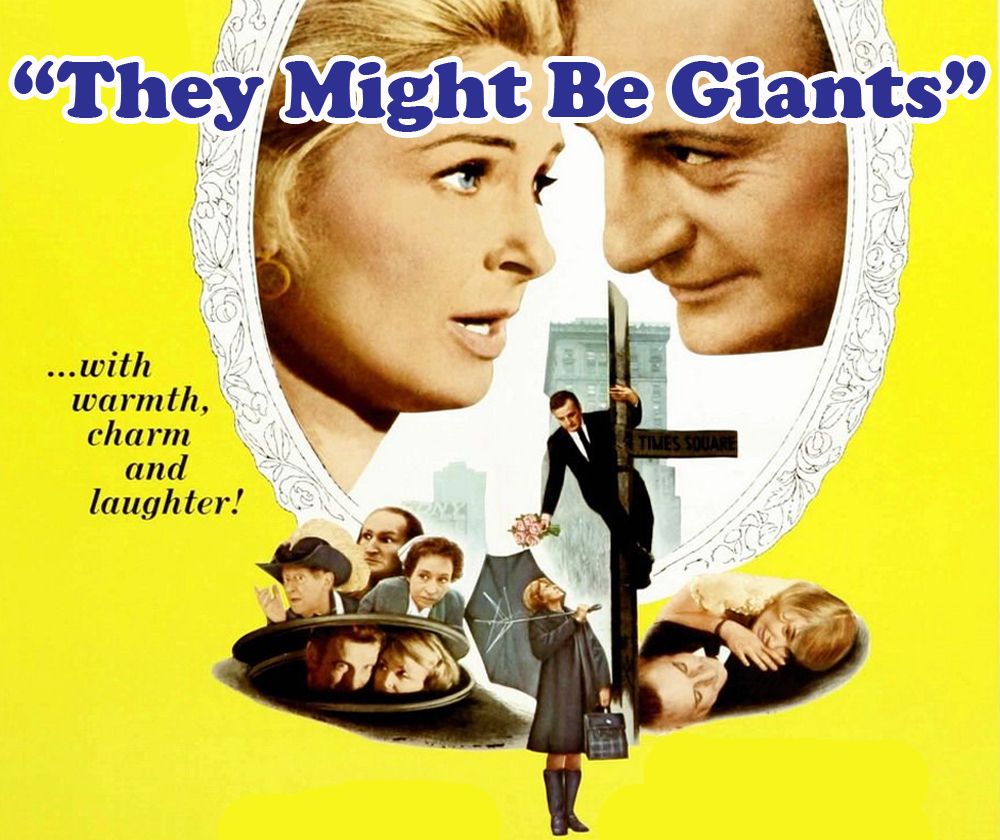They Might Be Giants is a 1971 comedy/mystery that ends like a horror movie. Filmmakers of that era knew how to generate ambiguity. It wasn’t like modern ambiguity, where vagaries are introduced and not fully explored. They Might Be Giants gives viewers all of the puzzle pieces needed, and they can fit them together to suit their interpretation.
The plot of They Might Be Giants goes like this: after the death of his wife, a man retreats into a fantasy world where he views himself as Sherlock Holmes. He spends his days investigating meaningless clues in an effort to defeat his archenemy, Moriarty.

Cast Of They Might Be Giants
Anthony Harvey directed They Might Be Giants. Harvey started out as an actor and ended up as a film editor. He eventually worked with Stanley Kubrick on Lolita and Dr. Strangelove. This led to Kubrick saying…
“[You are] becoming more impossible than Peter Sellers. You’d better hurry up and direct. Then you won’t be so annoying in the cutting rooms.”
Playwriter James Goldman wrote They Might Be Giants. He also worked with the great William Goldman (Butch Cassidy and the Sundance Kid, The Princess Bride) a number of times. This is because James is William’s younger brother…
They Might Be Giants stars legendary actor George C. Scott – the man who looks like a potato but owns every camera ever pointed at him. Scott does a typically solid job in the movie, effortless swinging between comedic, serious, gruff, rascally, and irrepressible.
At Scott’s side is the woman who tamed Paul Newman: Joanne Woodward. Woodward plays a psychiatrist who sets out to cure Scott. Instead, she is dragged along on his quest to defeat Moriarty. Woodward said she had such an unhappy time making the They Might Be Giants that she considered retiring. She never elaborated on why, and nothing amiss exists in her performance.
Like the main character of the movie, one can only manufacture postulations for her unhappiness. Watching the film, viewers get the idea it might have been a rough shoot. New York looks as gritty as it always does in 70s movies, along with cold and wet. The film has Woodward and Scott running all over the place, filming among pedestrians and doing night shoots. It is understandable if that got to be a drag.
Furthermore, maybe a person can only endure so much Scott. A weird energy radiates from that man. He is like a quirky grandfather with a sledgehammer hidden behind his back.
Numerous character actors also appear in the film: Al Lewis, Rue McClanahan, James Tolkan, Paul Benedict, M. Emmet Walsh, Oliver Clark, and Jack Gilford. They Might Be Giants was also the movie debut of F. Murray Abraham.

Thoughts On They Might Be Giants
Even though They Might Be Giants was billed as a comedy-mystery, it isn’t particularly funny, nor is it a proper mystery. It’s an odd film, really. It has a Fisher King quality, and one wonders if it inspired Terry Gilliam. Interestingly, a scene at the telephone company is nearly full-on Terry Gilliam. The title of They Might Be Giants is a reference to Don Quixote, who believed windmills to be “monstrous giants,” despite the protests of his aide Sancho Panza. In reference to this, Scott’s character argues…
“Of course, he carried it a bit too far. He thought that every windmill was a giant. That’s insane. But, thinking that they might be… Well, all the best minds used to think the world was flat. But, what if it isn’t? It might be round. And bread mold might be medicine. If we never looked at things and thought of what they might be, why, we’d all still be out there in the tall grass with the apes.”
And that brings us to the rub of the matter. Scott’s character clearly had a mental breakdown and said “Tootle-loo” to reality. Instead of other characters helping him heal, they are drawn into his delusion. While Woodward follows Scott’s fantasy quest, she begins to realize that having windmills to tilt at is better than having a messy, normal life. Other characters come to this conclusion, as well, and follow Scott as he marches off into the night to finally face Moriarty.
At the end of the movie, the viewer is left with the question, does Moriarty actually exist?
The answer is pretty clearly, no, and Woodward’s character has chosen madness over reality. This is a rather chilling conclusion for what is advertised as a whimsical comedy/mystery.
In The Final Analysis
At the time it was released, nothing about They Might Be Giants set it apart. It’s firmly average. Yet, it takes on a bit of a new life to modern eyes. We live in an era where people are encouraged to identify as how they feel. Men identifying as women, and women identifying as men are really only scratching the surface of this trend. How far can that go? If a person identifies as Sherlock Holmes, do we all have to play along? And if, by playing along, are we losing who we are in the process?
This is the question They Might Be Giants poses to the audience. The game is afoot! Or does the game identify as a hand? Perhaps a torso? Who’s to say? It’s all “alimentary,” dear Watson…
Check back every day for movie news and reviews at the Last Movie Outpost










